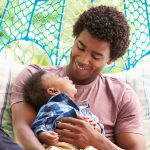 Measuring is a math skill your child will use a lot once they’re in school, but you may not realize how often they use it long before that – as early as infancy! By 12 months, your little one might begin to understand concepts like shorter and taller, even if they don’t know their exact definitions.
Measuring is a math skill your child will use a lot once they’re in school, but you may not realize how often they use it long before that – as early as infancy! By 12 months, your little one might begin to understand concepts like shorter and taller, even if they don’t know their exact definitions.
Highlights:
|
During ages 1 and 2, toddlers begin to understand basic measurement concepts of weight, volume, length and temperature. They might be able to tell when a toy is heavier than another, for example, or when one bucket can hold more toys than another.
Why are measurement skills relevant in early childhood? Introducing measurement concepts to your little one allows them to grasp the basics so they can build upon those skills later. Eventually, your child will use measurement skills for everyday tasks such as cooking, organizing objects in the home, understanding time, and using money. Practicing measurement in early childhood also nurtures critical thinking and problem-solving skills.
Measurement in the Early Years
You might be surprised by how much measuring your child is doing at such a young age. Your baby doesn’t use numbers and rulers, but they do use their eyes and hands to begin to learn about measurement concepts.
Your baby or toddler might “measure” by:
- Noticing that one board book is thicker – and a little more challenging to hold – than another.
- Filling a cup with water in the bathtub.
- Using a measuring cup or food container to scoop small toys into a larger container.
- Using a small shovel to transfer dirt into a pail until it gets full.
- Lining up books from smallest to largest.
- Lining up crayons or markers from end to end to reach across the table.
- Comparing the sizes of measuring spoons and cups while helping you in the kitchen.
- Using comparison words, like bigger or shorter.
In other words, measurement concepts come through as your toddler participates in hands-on play and activities. If they’re playing, they’re learning!
Supporting Measurement Learning
If you’re using BabySparks, you’ll see lots of measurement activities in your daily play program. We love to use a variety of objects for this learning (hint: food storage containers are great for this).
Joining your child’s play helps bridge the gap between what they see and what they understand. Make simple observations out loud, like “Wow, this car is heavier than that one.” Work with what your child is doing and add to it. For instance, if your toddler is pouring rice from a measuring cup into a bowl, you might offer to count how many scoops it takes to fill the bowl.
Helping your toddler focus on measurement skills lays an important early math foundation that they will continue to build on throughout childhood.
Back







